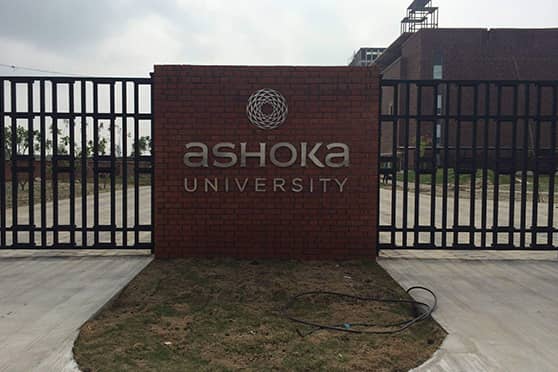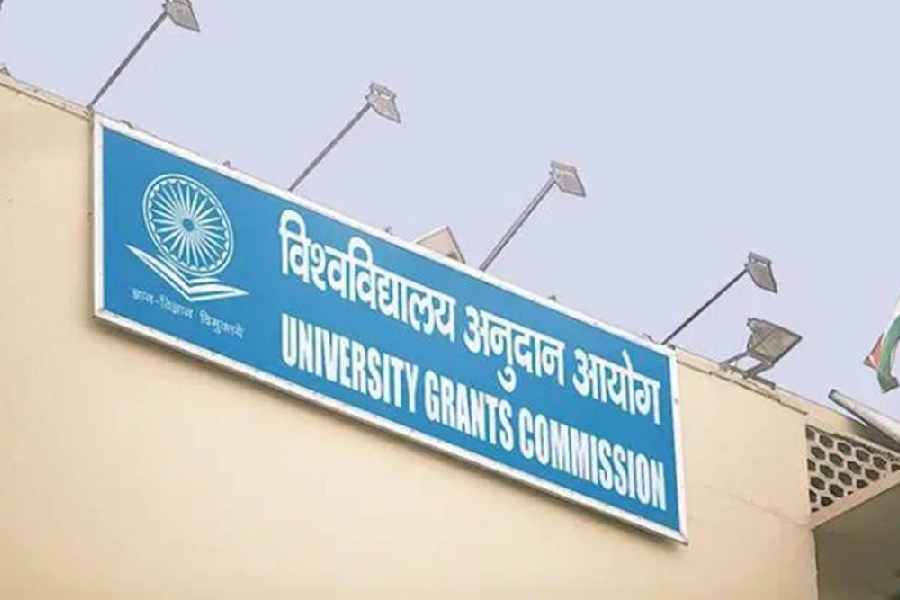An unpublished economics research paper on alleged electoral manipulation has set the cat among the pigeons in India’s political Twitterverse.
Ashoka University that employs the author has put out a statement saying “social media activity or public activism by Ashoka faculty, students or staff in their individual capacity does not reflect the stand of the University”.
The content of the paper may be hard for many laypersons to understand but the key question the debate has stirred is about the scope of freedom on campuses, including those administered by private institutions, in the country.
The paper, “Democratic Backsliding in the World’s Largest Democracy”, by Sabyasachi Das, an assistant professor of economics at Ashoka University in Haryana’s Sonipat, says that it “documents irregularity in India’s 2019 general election data by showing that the incumbent party’s win margin distribution exhibits excess mass at zero, while no such pattern exists either in previous general elections or in state elections held simultaneously and subsequently. This implies that the incumbent party in 2019 won a disproportionate share of closely contested elections.”
It also has a disclaimer that says: “The tests are, however, not proofs of fraud, nor does it suggest that manipulation was widespread.”
The paper itself has not been published by a peer-reviewed journal — an internationally recognised process under which experts in the field put the thesis through academic rigour. This would also enable lay persons to gain a better understanding of the claims made.
However, Das did present his paper at the National Bureau of Economic Research’s Summer Institute 2023, at Cambridge in the US last week, which entails some degree of peer review. The paper is archived in the Social Science Research Network e-library.
The debate on the paper began on Monday with an X-thread (formerly Twitter thread) by M.R. Sharan, assistant professor of agricultural and resource economics at the University of Maryland in the US.
Sharing excerpts from the paper, Sharan said: “The BJP won the 2019 parliamentary elections in India: but was it ALL fair and square? This astonishing new working paper by @sabya_economist provides scientific evidence that suggests vote(r) manipulation by BJP. And no, this is NOT about EVMs.
“Over the past few years, we have seen claims that the party in power indulges in electoral fraud mainly via manipulating EVMs. But this paper shows that fraud occurs even if you don’t believe the EVM manipulation story!
“Also, Muslims are especially vulnerable. The 2024 elections are around the corner, with the BJP perhaps on a weaker footing (more close races?) The need is to be vigilant: parties, civil society organisations, courts and the ECI should strategise to curb manipulation.”
Congress MP Shashi Tharoor retweeted Sharan’s thread and said: “This thread offers a hugely troubling analysis for all lovers of Indian democracy. If the Election Commission and/or the Government of India have answers available to refute these arguments, they should provide them in detail. The evidence presented does not lend itself to political attacks on a serious scholar. E.g. the discrepancy in vote tallies needs to be explained, since it can't be wished away.”
In 2019, the EC had denied the Congress’s claims of a mismatch, saying no discrepancy was found in the form 21E with voter tallies that are issued by returning officers.
On Tuesday, the university said in a statement on Twitter (now X): “Ashoka University is dismayed by the speculation and debate around a recent paper by one of its faculty members (Sabyasachi Das, Assistant Professor of Economics) and the university's position on its contents.”
The varsity added: “Ashoka values research that is critically peer-reviewed and published in reputed journals. To the best of our knowledge, the paper in question has not yet completed a critical review process and has not been published in an academic journal. Social media activity or public activism by Ashoka faculty, students or staff in their individual capacity does not reflect the stand of the University.”
In 2021, political scientist Pratap Bhanu Mehta quit saying that the founders of the varsity had made it clear to him that he is a “political liability”. Economist Arvind Subramanian also quit in solidarity with Mehta, who was seen as a victim of intolerance against his newspaper columns criticising the ruling BJP.
Gilles Verniers, director of the varsity’s Trivedi Centre for Political Data, tweeted: “I condemn the vicious attacks against @sabya_economist , a colleague of rare courage and integrity. If we don't leave room for research that is inconvenient, we shut the door to the possibility of fixing our problems.”
Pune-based political scientist Suhas Palshikar tweeted: “When a prestigious private university goes out of its way to tweet to dissociate itself from an ongoing research work, we can assure ourselves that academic freedom has met with its end finally among the country's institutions.
“With undeclared restrictions on research and fieldwork by scholars based outside of India and squeezing of autonomy of researchers within the country, we are managing to scuttle the core ability of social science research to examine, critique and search for alternatives.
“That will enhance the project of creating ignorant and obedient citizens and servile and ideologically committed administrators.”
He added in a reply to a tweet supporting the varsity’s statement: “A special tweet makes it special. Had the university put up on its website a routine notice long ago that it neither rejects nor validates research by its faculty, that would be another matter.”
Not everyone agreed with the content of the paper even while lauding the attempt.
Anant Sudarshan, who teaches economics at the University of Warwick and the University of Chicago, posed a series of questions on the assumptions and methods of Das. He tweeted: “Let's reiterate that @sabya_economist has written a careful, rigorous, and brave paper. BUT suggestions of election fraud need to clear a high bar and cannot be uncritically retweeted. There are some things about this paper that undercut that bold title.”
He added: “Again this is an important, useful paper. The millions of trolls throwing 2 INR abuses at the author and others are best ignored. But this is not watertight evidence of fraud IMO. If I were the talented author, I would find some of these poll booth observers and interview them.”
Author Hindol Sengupta tweeted: “There is a simple and very basic question that the paper does not answer and it is worth asking the academic @AshokaUniv — if ‘voter manipulation’ is the key to winning in national polls, how come the same party does not manage to do so in state elections where a far tighter grip on data and machinery is plausibly possible, but the same party loses, from time to time, state elections as the incumbent?”
Some BJP supporters threw the anti-national playbook at Das and Ashoka University.
Party MP Parvesh Sahib Singh tweeted: “This (varsity’s) statement is as bad as the paper, if not worse. The moot point is — the author is suggesting our election process is flawed — and he is saying it without any basis. We need to keep discussing this — how anti-India elements are discrediting our democratic framework."
Das did not respond to a request from this paper seeking his comments. He retweeted Paul Gertler, Li Ka Shing Professor of Economics at the University of California, Berkeley, who wrote: “I saw this presented. It was by far one of the most convincing pol Econ papers that I have seen recently.”












